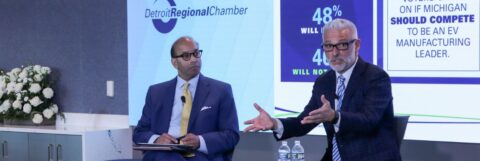On Oct. 22, the Detroit Regional Chamber hosted leading pollster Richard Czuba, Founder of Glengariff Group, who discussed highlights from the 2024 Fall Voter Poll, including key issues of voters’ contradicting perceptions on education and the future economy.
What’s on the Minds of Michiganders Ahead of 2024 General Election?
October 23, 2024
The Price of Education
Czuba opened the discussion by highlighting that the 2024 election year has been atypical. Not only has Michigan become “the epicenter of American politics” in recent weeks, but several ‘firsts’ have taken a toll on voters, including a candidate found guilty of felony charges, a hurricane affecting key battleground states, and two wars in separate regions. Czuba says it shows that not one specific issue is influencing voters, but rather, many are creating a polarized constituency.
“The story we’re seeing in the polling right now in Michigan … is those things that used to unite us Michiganders are now being used to divide Michiganders and specifically on education and economic opportunity,” Czuba said.
The polarization is also playing out regarding postsecondary education. Data from the latest poll shows that 22% of respondents found that a college degree is worth the money, while 52% said it is not worth it, with those not college-educated and in rural areas being the lead contributor to that number.
Gen Z’s and College
Tightening the lens on education, 46% of parents hope their children go to college – compared to the 62% of those respondents’ kids are interested in college. These statistics shed light on the disconnect between voter backgrounds and age, suggesting that Gen Z had a more positive outlook on education.
“We’re seeing a situation where we question the value of education in a world increasingly reliant on you having that education, and parents’ beliefs are actually holding their kids back from what they want.”
The MotorCity’s Legacy vs. Its Future
As the conversation shifted from education, it shed light on Michigan’s automotive industry and its current lack of competitiveness for the future. With a margin of 50 to 45, voters responded that the state should compete more aggressively, but respondents are divided on how it should be done, with the majority not favoring the industry’s shift to EVs. On this, Czuba noted, “the people most likely to say we’re not prepared are also the ones telling us they’re not willing to get more education will fit into that economy.”
Failing to lean into EVs will be costly to Michigan. Czuba sharing it would be “a real strategic error,” comparing it to the industry’s failure to accommodate consumers’ desire for smaller, more fuel-efficient cars in the 1970s and ‘80s.
He asked, “Do we want to leave that market for someone else who spends a lot more time in this space?”
Where This Leaves the Business Community
Michiganders’ dissonance leaves the business community in limbo as they look for business-friendly elected officials to align with – party-wise, some candidates may not be who business leaders thought they would vote for. As the conversation came to a close, Czuba noted that democracy and free enterprise are vital to Michigan’s future – no matter the election outcome.
“I continually say that the business community no longer has a political party,” Czuba said. “The business community does not have a natural party right now. Natural business supporters are elements in both parties.”

